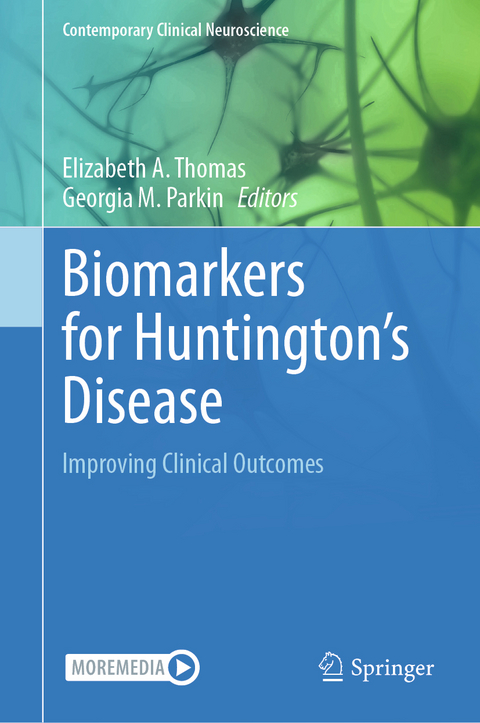
Biomarkers for Huntington's Disease
Improving Clinical Outcomes
Seiten
2023
Springer International Publishing (Verlag)
978-3-031-32814-5 (ISBN)
Springer International Publishing (Verlag)
978-3-031-32814-5 (ISBN)
Huntington's disease (HD) is a fatal, inherited, neurodegenerative disorder, characterized by chorea, motor instabilities, psychiatric manifestations and cognitive decline. Early genetic testing provides an opportunity for clinical interventions aimed at delaying onset and/or slowing progression of disease; however, current treatments for HD are limited, with only two FDA-approved drugs available to manage chorea. Encouragingly, however, several disease-modifying treatment approaches are in the therapeutic pipeline, with more than 200 clinical studies, and many more preclinical studies, in the works. Robust and reliable biomarkers are needed to predict disease onset, monitor disease progression and assess treatment responses. More specifically, biomarkers to stratify patients for clinical trials and biomarkers to track drug efficacy will certainly lead to improved clinical trial design and success. This book represents the first book focused solely on biomarkers for HD and represents adistinct resource that will be informative, not only for clinicians and those involved in clinical trial design, but also for a wide range of neurodegenerative disease researchers. This edited volume is written by top leaders in the field, and takes a cross-disciplinary approach to cover a broad spectrum of biomarker types, in order to provide the latest advances in the development of biochemical, molecular, imaging and digital biomarkers that have been investigated for HD. With the ultimate goal of treating patients, the development of disease-associated biomarkers has never been more important.
lt;p>Elizabeth A. Thomas, Ph.D.
Elizabeth A. Thomas received her Bachelor's degree in biochemistry from the University of California (UC), Berkeley in 1989, and then studied at the UC Irvine, School of Medicine, receiving her Ph.D. in pharmacology in 1994. International appointments include time as an Adjunct Research Officer at the Mental Health Research Institute of Victoria in Melbourne, Australia, followed by an Honorary Senior Research Fellow at The Florey Institute of Neuroscience and Mental, Health, also in Melbourne, Australia. She is currently the laboratory director of the Institute for Interdisciplinary Salivary Bioscience Research at UC Irvine, and also holds positions of Research Professor in the Department of Neurobiology and Human Behavior at UC Irvine, and Adjunct Associate Professor in the Department of Neuroscience at the S^100 peer-reviewed publications to date, and her work has appeared in journals such as Nature Neuroscience, Proceedings of the National Academy of Sciences, Cell Stem Cell, Human Molecular Genetics, Biological Psychiatry and Molecular Psychiatry.Georgia M. Parkin, Ph.D.
Georgia M. Parkin received her Bachelor's degree in biochemistry from the University of Melbourne, Australia in 2011, her Master's degree in neuroscience from the University of Zurich, Switzerland in 2014, and her Ph.D. in neuroscience from the Florey Institute of Neuroscience and Mental Health, and the University of Melbourne, Australia in 2019. Her work has spanned the fields of traumatic brain injury, psychiatric illness with a focus on schizophrenia and bipolar disorder, and Huntington's disease. Dr. Parkin is academically trained in laboratory-based research, with her past studies focusing on cell culture and mouse models, as well as human subjects and clinical patients, and involving biospecimens such as post-mortem brain tissue, blood, saliva and cerebrospinal fluid. Concurrent to, and following, completion of her Ph.D., Dr. Parkin has also specialized in clinical biomarker research, through appointments at the Murdoch Children's Research Institute and Royal Melbourne Hospital, Australia, and the Institute for Interdisciplinary Salivary Bioscience Research at University of California, Irvine. She currently works in the Department of Neurosciences at the University of California, San Diego, and is part of the Huntington's Disease Society of America Center of Excellence at this site. Her published work has been featured in journals including Nature Neuroscience, Neuroscience and Biobehavioral Reviews, Bipolar Disorders, International Journal of Molecular Sciences, among others; her research has also been shared by multiple news sites.Molecular Biomarkers.Somatic instability/Telomeres,- Genetic modifiers.- Current clinical trial biomarkers.-Pharmacodynamic biomarkers for Htt-lowering therapeutics.-Inflammatory biomarkers.-Sleep dysregulation markers.-Mitochondrial/Oxidative stress biomarkers.-Microbiomics.- Metabolomics.-Proteomics.-Transcriptomics.-Lipidomics.-Imaging marker overview.-Retinal imaging biomarkers.- MRI - non-invasive functional MRI measures.- The evolution of clinical trial methodology.-Digital biomarkers.- The future of telehealth.- Summary and future trends.
| Erscheinungsdatum | 14.10.2023 |
|---|---|
| Reihe/Serie | Contemporary Clinical Neuroscience |
| Zusatzinfo | XVI, 475 p. 42 illus., 39 illus. in color. |
| Verlagsort | Cham |
| Sprache | englisch |
| Maße | 155 x 235 mm |
| Gewicht | 853 g |
| Themenwelt | Medizin / Pharmazie ► Medizinische Fachgebiete ► Neurologie |
| Medizin / Pharmazie ► Studium | |
| Naturwissenschaften ► Biologie | |
| Schlagworte | biofluids • Biomarkers • Chorea • Clinical Trials • fluid biomarkers • Huntington's disease • Huntington's disease • Imaging biomarkers • movement disorders • Neurodegeneration |
| ISBN-10 | 3-031-32814-0 / 3031328140 |
| ISBN-13 | 978-3-031-32814-5 / 9783031328145 |
| Zustand | Neuware |
| Haben Sie eine Frage zum Produkt? |
Mehr entdecken
aus dem Bereich
aus dem Bereich
interdisziplinäre Diagnose- und Behandlungsstrategien
Buch | Hardcover (2024)
Urban & Fischer in Elsevier (Verlag)
CHF 135,75
Buch | Hardcover (2024)
Springer (Verlag)
CHF 195,95
Material für visuell Lernende
Buch | Softcover (2023)
Kohlhammer (Verlag)
CHF 61,60


